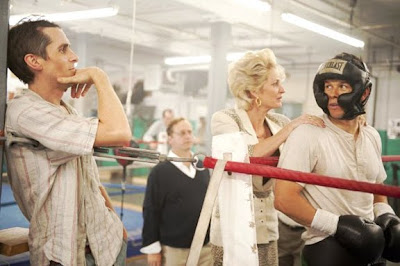
"Winter's Bone" follows a young heroine Ree, as she is forced to find her father, a meth addict who has abandoned the family and issued their house up for his bail bond. Therefore, if he does not show up for his court date, Ree - along with her ill mother and two younger siblings - loses the house. The film, directed by Debra Granik, is conveyed with great naturalism. From the performances to the set decorations, nothing in the film feels inauthentic. Granik and company not only masterfully develop the film's setting, but also give the film a distinct atmosphere. Through its expert attention to detail, "Winter's Bone" instills its audience with chilly feelings of dread and despair. That is not to say the film's all gloomy. The film's single ray of hope comes from its protagonist. Although it's clear that Ree wishes she could return to being a child, she accepts her responsibility to care for her younger siblings and track down her father, and she does so with great conviction and tenacity. Actress Jennifer Lawrence excels in conveying Ree's steely resolve, as well her heartbreaking vulnerability. Her performance, along with Granik's superb direction, makes "Winter's Bone" a chilling portrait of despair and the perseverance that ultimately springs from it.
 In "The Fighter," director David O. Russell (I Heart Huckabees) fights to turn a conventional script into a complex portrait of a boxer and his dysfunctional family. Unfortunately, he does not entirely succeed. The film follows boxer Mikey Ward (Mark Wahlberg) as he struggles to make a name for himself due to the reckless behavior of his crack addict brother, Dicky Eclund (Christian Bale), and the authoritarian control of his mother (Melissa Leo). As a director, Russell seems more interested in familial politics than boxing. Unfortunately, the film's script contains the narrative of a conventional underdog sports story. While Russell tries his best to make "The Fighter" unique, he ultimately fails in giving the film a cohesive tone. Some scenes feel like a gritty family drama. Others feel like a paint-by-numbers sports film. And some even take on a farcical tone. While a few individual scenes make an impact, and the film's ensemble hosts several great performances, the film ultimately fails to work as a whole. The film also suffers in its final act. While the film manages to create a riveting conflict between Micky and the destructive members of his family, it never really resolves the family's conflict in a meaningful way. Instead, the characters cheer away their problems by rooting for Micky in a pivotal match. While this may make for a moving ending to "The Fighter," it's also a simplistic one, especially considering the complex familial politics Russell explores in the film's first two-thirds. Unfortunately, these inconsistencies prevent "The Fighter" from being a great film. While the film is certainly entertaining, it's disappointing that Russel and company did not shoot for something greater.
In "The Fighter," director David O. Russell (I Heart Huckabees) fights to turn a conventional script into a complex portrait of a boxer and his dysfunctional family. Unfortunately, he does not entirely succeed. The film follows boxer Mikey Ward (Mark Wahlberg) as he struggles to make a name for himself due to the reckless behavior of his crack addict brother, Dicky Eclund (Christian Bale), and the authoritarian control of his mother (Melissa Leo). As a director, Russell seems more interested in familial politics than boxing. Unfortunately, the film's script contains the narrative of a conventional underdog sports story. While Russell tries his best to make "The Fighter" unique, he ultimately fails in giving the film a cohesive tone. Some scenes feel like a gritty family drama. Others feel like a paint-by-numbers sports film. And some even take on a farcical tone. While a few individual scenes make an impact, and the film's ensemble hosts several great performances, the film ultimately fails to work as a whole. The film also suffers in its final act. While the film manages to create a riveting conflict between Micky and the destructive members of his family, it never really resolves the family's conflict in a meaningful way. Instead, the characters cheer away their problems by rooting for Micky in a pivotal match. While this may make for a moving ending to "The Fighter," it's also a simplistic one, especially considering the complex familial politics Russell explores in the film's first two-thirds. Unfortunately, these inconsistencies prevent "The Fighter" from being a great film. While the film is certainly entertaining, it's disappointing that Russel and company did not shoot for something greater.
No comments:
Post a Comment